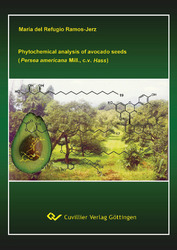| Areas | |
|---|---|
| Serie de libros (96) |
1381
|
| Nachhaltigkeit |
3
|
| Gesundheitswesen |
1
|
| Letra |
2370
|
| Ciencias Naturales |
5408
|
| Matemática | 229 |
| Informática | 319 |
| Física | 980 |
| Química | 1364 |
| Geociencias | 131 |
| Medicina humana | 243 |
| Estomatología | 10 |
| Veterinaria | 108 |
| Farmacia | 147 |
| Biología | 835 |
| Bioquímica, biología molecular, tecnología genética | 121 |
| Biofísica | 25 |
| Nutrición | 45 |
| Agricultura | 1005 |
| Silvicultura | 201 |
| Horticultura | 20 |
| Ecología y conservación de la tierra | 148 |
| Ciencias Ingeniería |
1795
|
| General |
98
|
|
Leitlinien Unfallchirurgie
5. Auflage bestellen |
|
Erweiterte Suche
Phytochemical analysis of avocado seeds (Persea americana Mill., c.v. Hass) (Tienda española)
Maria del Refugio Ramos-Jerz (Autor)Previo
Indice, Datei (56 KB)
Lectura de prueba, Datei (180 KB)
The cultivation of avocado fruits (Persea americana Mill.) is expanding around the world. Major producer of this crop is Mexico. In Mexican and African ethnomedicine decocts of avocado seeds are used as a potent remedy against different diseases such as muscle paint, menstruation disturbs and diabetes (Adeboye et al., 1999; Adeyemi et al., 2002).
This was one of the initial points for conducting a thorough phytochemical investigation on avocado seeds with the focus on analysis of extractable natural products in respect to their potential use for pharmaceutical and food applications. During avocado fruit processing, the residual seeds will be deposited as waste material. Aim of the study was to analyze the chemical composition of avocado seeds, including preparative isolation and complete structural characterization of the isolated natural products by spectroscopical tools. Bioactivities of crude extracts and also of purified structures were screened by efficient and relatively inexpensive assays.
During this research on avocado seeds, the implementation of ‘high-speed countercurrent chromatography’ (HSCCC) technique proved to be a versatile tool for efficient fractionation and isolation of natural products. The combination with other classical separation methods (i.e. size exclusion gelchromatography, preparative HPLC) resulted in the isolation of 22 natural products from avocado seeds. Isolation procedures were guided by using the TEAC-assay (antioxidant capacity) and the ‘brine-shrimp’-assay with Artemia salina L. (cytotoxic activity) directing to the bioactive principles.
The structure elucidation of the isolated compounds was performed by means of 1D-NMR (1H, 13C, DEPT135, diff-NOe), 2D-NMR (1H/1H-COSY, HMQC and HMBC). UV/Vis-spectroscopy and circulardichroism (CD), mass spectrometry (GC-EI/MS, direct EI-MS, DCI-MS, and HPLC-ESI-MS/MS) were also applied. Chemical derivatization such as acetylation, enzymatic hydrolysis and thiolysis reaction were conducted for structural confirmation of complex natural products.
The recovered compounds from avocado seeds ranged in their polarity from extremely polar (i.e. proanthocyanidins) to very lipophilic acetogenins (i.e. persin) (cf. Fig. A to C).
The results of our phytochemical study are coherent with the ethnomedicinal knowledge from the indigenous people of Mexico and other cultures. The use of avocado seeds for certain diseases are at least in part explainable by the recovered natural products and their known and investigated activities.
Interestingly, the use of avocado seed as antioxidants in some traditional foods and dishes of the Mexican people was proved by the high antioxidative activity of some of the isolated compounds (26, 94, 95, 28 and 29). Interestingly, substances 94, 95, 28 and 29 (recovered from the ethyl acetate partition) demonstrated a higher antioxidant activity than the common synthetic antioxidants. Natural avocado compounds from the polar extracts seem to be non-toxic, therefore the ethyl acetate extract or its purified compounds could be also used as potent antioxidant formulations by the food industry.
The lipophilic extracts (PE) and fractions were found to be extremely cytotoxic, hence the use in food industry is not appropriate. Evaluation of these compounds against cancer cell lines could result in new bioactive anti-tumor agents.
More research in this field remains to be done in the future for deepening the insights into the potentials of avocado seed natural products.
Further natural compounds from avocado seeds are waiting to be isolated and to be tested in specific bioassays. Avocado seeds already applied in ethnomedicine by the traditional healers of the ancient Aztec cultures in Mexico may provide potential novel drugs of the future.
| ISBN-10 (Impresion) | 3867273898 |
| ISBN-13 (Impresion) | 9783867273893 |
| ISBN-13 (E-Book) | 9783736923898 |
| Formato | A5 |
| Idioma | Inglés |
| Numero de paginas | 348 |
| Edicion | 1 |
| Volumen | 0 |
| Lugar de publicacion | Göttingen |
| Lugar de la disertacion | Braunschweig |
| Fecha de publicacion | 16.10.2007 |
| Clasificacion simple | Tesis doctoral |
| Area |
Química
|








